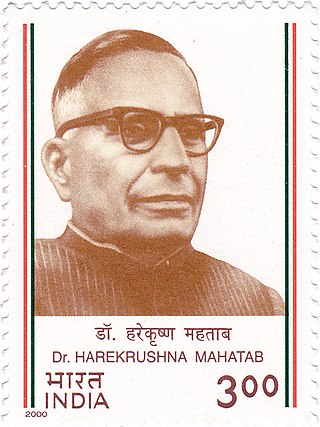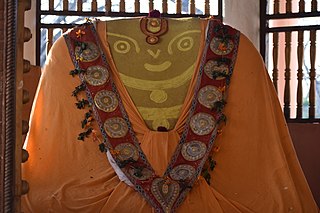
Jayadeva, also spelt Jaideva, was a Sanskrit poet during the 12th century. He is most known for his epic poem Gita Govinda which concentrates on Krishna's love with the gopi, Radha, in a rite of spring. This poem, which presents the view that Radha is greater than Krishna, is considered an important text in the Bhakti movement of Hinduism.

Capital High School, located in Bhubaneswar, is one of the oldest schools in the Indian state of Odisha and was established in 1951. The school is situated in unit-III near Ram Mandir and is adjacent to St. Joseph's High School and The Blind School. It is affiliated to the Board of Secondary Education, Odisha under State Government of Odisha. Ganesh Chandra Mishra was the first headmaster, taking charge of the newly established school on 16 July 1951. After Mishra, many other teachers such as Laxman Kara and Sarat Chandra Basu have taken over as headmaster and led the school to more success.
The Karan or Karana is a community found in the state of Odisha in India. The post of Karana used to be a professional designation that was occupied by literate peoples. They held Karanam posts in some parts of Andhra Pradesh, where they speak Odia and played a similar role in Odisha to that of the Kayasthas of West Bengal and Bihar. In the social hierarchy of Odisha they rank next to Brahmins. They exclusively served the ruling powers as their ministers, advisors, governors, military commanders, record keepers and dewans. They owned most Zamindaris in Odisha. They have the highest literacy caste-wise and are highly prosperous. Today they are a politically dominant community and have reigned over the politics of Odisha for 50 years.
The birthplace of the twelfth-century Sanskrit poet Jayadeva, author of the Gitagovinda, has been disputed, with the neighboring states of Odisha, West Bengal and the region of Mithila in the state of Bihar staking a claim. This had led to a bitter feud between people on both sides that lasted for over a century. The issue is still debated by scholars.
Ramananda Ray lived in the Indian state of Odisha (Oḍiśā) during the latter part of the 15th century to around the middle part of the 16th century CE and was the author of the celebrated drama Jagannatha Vallabha Natakam.
Odia literature is literature written in the Odia language, mostly from the Indian state of Odisha. The modern Odia language is mostly formed from Tadbhava words with significant Sanskrit (Tatsama) influences, along with loanwords from Desaja, English, Hindustani (Hindi/Urdu), Persian, and Arabic. Its earliest written texts date from around 1000 CE. The earliest Odia newspaper was Utkala Deepika, first published on August 4, 1866.

Sitakant Mahapatra is an Indian poet and literary critic in Odia as well as English. He served in the Indian Administrative Service (IAS) from 1961 until he retired in 1995, and has held ex officio posts such as the Chairman of National Book Trust, New Delhi since then.

Harekrushna Mahatab was the leader of the Indian National Congress, a notable figure in the Indian independence movement and the Chief Minister of Odisha from 1946 to 1950 and from 1956 to 1961. He was popularly known by the sobriquet "Utkal Keshari".

Enḍuri Piṭhā, also known as Haḷadi Patra Piṭhā, is a variety of pitha made in the Indian state of Odisha mostly in the northern, eastern and central region. Ingredients are turmeric leaves, black gram, rice flour, coconut or Chhena, jaggery, black pepper. Enduri is mostly prepared during Prathamastami and Manabasa Gurubara. It is a light snack and has laxative effect because of the turmeric leaves that are used to wrap the pitha. Traditionally, enduri used to be made by steaming in large earthen pots. Enduri is one of the many other pithas offered to Jagannath in the Jagannath Temple, Puri for "Sakala dhupa" (breakfast).

Pandit Nilakantha Das (1884-1967) was one of the most illustrious sons of Odisha, who appeared both in its political and literary arena at the most crucial period of its history, when Odisha had no political identity in the map of India, and Odia as a language was about to be extinct. He worked relentlessly for Odisha's recognition both politically and linguistically, and helped bring to fruition the dreams of Utkala Gaurab Madhusudan Das, Utkalamani Gopabandhu Das and all other Odia loving people.

Binod Kanungo (1912–1990) was an Odia author, freedom fighter, Gandhian, educator, social reformer and compiler of the Gyana Mandala, which is the greatest encyclopaedia in the Odia language. He also won the Odisha Sahitya Akademi Award for his travelogue Runa Parishodha (1983). He was also a veteran freedom fighter and notable educationist. He was awarded with India's fourth highest civilian honour "Padmashree". He died on 22 June 1990.
Ramesh Chandra Bhanja was a writer, teacher, educationist, linguist, historian, editor and dramatist from Odisha. He has written many short-stories & poetry collections for children of all age groups. For his book Gapa Ganthili, he received the Odisha Sahitya Academy Award.
Keshab Chandra Dash, is a scholar and author from Odisha.
Natabara Samantaray was an Odia writer and literary critic. Some of his known literary historical works are Odia Sahityara Itihasa (1803-1920), Adhunika Odia Sahityara Bhittibhumi and Vyasakabi Fakirmohan. His critical review included works of many noted Odia authors like Fakir Mohan Senapati and Radhanath Ray. His historical research includes all of the major Odia writings published during 1803 until 1920 which accentuate the British Raj and its impact in coastal Odisha, and a critical analysis of the modern Odia literature.

Subrat Kumar Prusty is an Indian Odia-language scholar, activist, social entrepreneur, literary critic and author. He is Member Secretary of the Institute of Odia Studies and Research, Bhubaneswar, Odisha. He was instrumental in preparing the research documents, advocating the awarding of Classical Language status to Odia, forming Central Institute of Classical Odia, Odia University and implementation of the Odisha Official Language Act, 1954. He was awarded the Presidential Certificate of Honour and Maharshi Badrayan Vyas Samman – 2019 for Classical Odia.
The Jagamohana Ramayana also known as the Dandi Ramayana popularly across Odisha is an epic poem composed by the 15th-century poet Balarama Dasa. This work is a retelling of the Ramayana, though not a direct translation.

Jasobanta Dasa was an Odia poet, litterateur and mystic. He was one of the five great poets in Odia literature, the Panchasakha named Sri Ananta Dasa, Sri Jagannatha Dasa, Sri Balarama Dasa and Sri Achyutananda Dasa during the Bhakti age of literature.

Kuntala Kumari Sabat (1901–1938) was an Odia poet during colonial India. She was one of the women poets who came into prominence from Odisha during India's freedom struggle. She was multifaceted personality. She was a physician, writer, poet, editor, leader of nationalist movement and social worker. She was honored with Utkala Bharati in 1925.
Binod Chandra Nayak was an Odia writer. He was known for his writing that was influenced by modern poetry while being romantic. He was awarded the 1970 Kendra Sahitya Akademi award for his poetry collection Sarisrupa.
















